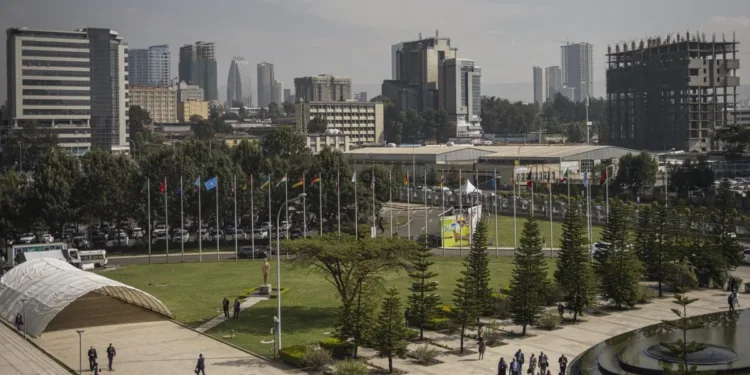Ethiopia is now on the brink of launching its first fully-fledged stock market and this is coming after over two years of laying the groundwork for an effective capital markets system.
Preparations for the launch of the Ethiopian Stock Exchange (ESX) are in the final stages. Interest groups from the country’s private sector, including major local banks and insurance companies, are making offers to acquire shares in the new exchange.
ESX expects to raise N625 million birr ($11 million) from the private sector, including local financial services firms, according to local reports. The company has raised N275 million birr ($4.9 million) from four state-owned companies under the country’s sovereign wealth fund Ethiopian Investment Holding (EIH) and FSD Africa, a “financial sector deepening” operation funded by the UK government.
Support from Ethiopia’s private sector, government and foreign development partners, as well as strong local participation, are expected to increase the attractiveness of the new stock market to foreign investors. Ethiopian government officials and financial executives are currently hosting investor roadshows across the continent and beyond.
“They aim to highlight ESX and the chance to tap into the country’s burgeoning private sector”, says Tewodros Sile, associate director at Africa Practice, an Africa-focused strategic advisory firm.
“ESX’s launch remains scheduled for late 2024, or early 2025, and continued investor roadshows throughout this year will remain critically important for building continued foreign investor confidence,” he told African Business from Addis Ababa.
“The roadshows have targeted key financial centers, including London, and are a recognition that, despite the potential opportunities in Ethiopia, the complexities and difficulties associated with market entry require a proactive approach to investors outside of the country.”
A boon for government and private sector alike Sile points out that the successful launch of a securities exchange could ease the perennial issue of limited capital access, a burden that many businesses in the country grapple with.
“ESX presents an opportunity for increasing funding flows from both domestic and international investors for firms listed on ESX. This is especially important, as, in many instances, access to finance and lack of capital inflows form some of the biggest obstacles to business growth in the country.”
The Ethiopian government also hopes the establishment of the exchange will help reduce its over-reliance on foreign debt. Through ESX, governments can issue long-term bonds in local currency, reducing dependence on foreign sources of budget financing. Ethiopia defaulted in December when the government was unable to pay $33 million in coupon payments on its Eurobonds, underscoring the economic risks Ethiopia faces because it lacks strong domestic capital markets.
How Ethiopia hopes to get people onboard
The launch of ESX is also aimed at allowing Ethiopian citizens to have a direct stake in their country’s economic prospects. In advanced economies, individuals often engage in the stock market via mutual funds, exchange-traded funds, and direct stock ownership. However, in emerging markets, the rate of citizen participation tends to fall short due to limited financial inclusion.
Also Read: How You Can Leverage Legal AI for Justice
Sile concedes that the journey towards encouraging Ethiopians to participate in the country’s nascent capital markets will likely be a slow and uneven process, given the vast number of people in the country who are yet to have access to formal banking services.
“Ethiopia has not had a stock exchange before,” Sile pointed out. A share exchange department within the State Bank closed in 1974 when companies were nationalized.
“More than two-thirds of the population remain outside of the formal banking system,” Sile says, emphasizing that boosting domestic awareness of the importance of lively capital markets will be crucial.
At the same time, efforts must also be made to deepen financial inclusion and improve financial literacy. A survey released by the World Bank in 2021 showed that in 2018/2019, about 30.5% of adults in Ethiopia had accounts in formal financial institutions. While this is an improvement from 21.8% in 2015/2016, Ethiopia’s level of financial inclusion is still weak compared with neighboring countries such as Kenya, where 90% of the adult population has access to formal financial services.
If Ethiopia’s ambition to build competitive capital markets is to succeed, it must also prioritize investment in technology and innovation. This includes investment in the technology and market infrastructure that underpins exchanges, such as trading platforms, clearing and settlement systems, and information dissemination mechanisms.
“Having a robust technological solution and infrastructure in place will be critical to averting fears of interference in ESX’s operations, and to give credibility as it starts its operations,” says Sile.
What you should know
In the initial phase of operations, the ESX expects to list a minimum of 50 companies. The pipeline is largely backed by the country’s sovereign wealth fund EIH, which plans to offer minority stakes in undisclosed state-owned companies from its portfolio. The exchange is also expected to launch trading in equities, derivatives, debt securities, and foreign exchange contracts.
A significant obstacle that could hamper the exchange’s growth is the country’s lack of major financial industry players, including stockbrokers, investment advisers, fund managers, and custodians. However, as new exchanges become operational, demand for these services is expected to increase, which is likely to spur growth in these key areas in the coming years.
Written by Adeluola Biola










